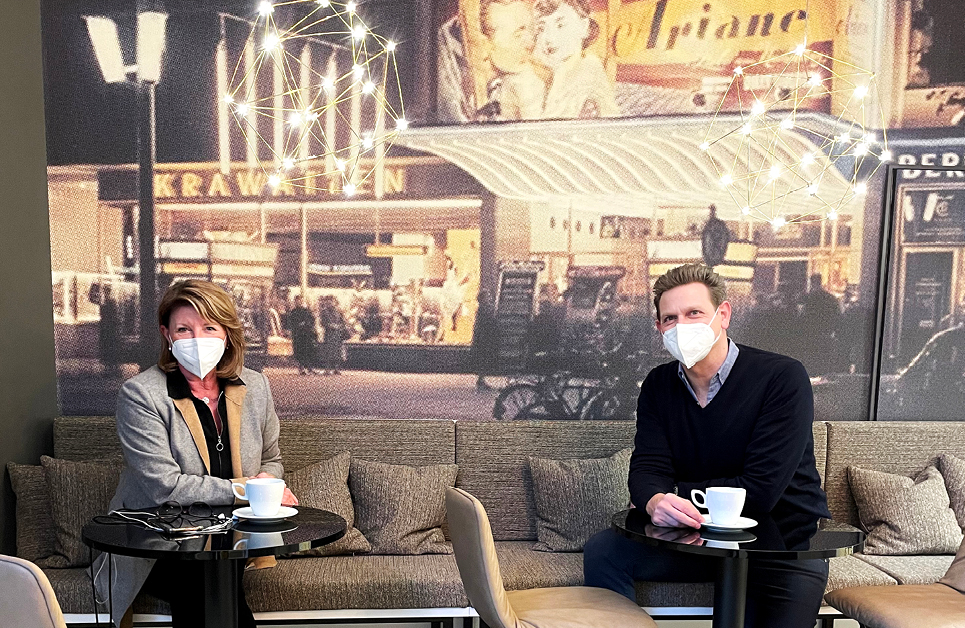Be careful with the term “home office.” Oliver Kaltner, CEO of Room, on hybrid working
Oliver Kaltner recently moved into his offices in the newest Satellite Office on Ku’damm. Today we talk about a topic that affects his company “Room” as much as Satellite Office. The theme intersection: hybrid, flexible working.
“Some days in the home office, some days in the office, some days traveling, always available, always in working mode” – that’s hybrid working for Oliver Kaltner. And this is not the distant future, but today’s lived reality. However, there is still room for improvement in many areas. Especially due to the virus, many trips no longer take place, which leads to more time in the office.
Oliver Kaltner is the CEO of the start-up “Room”. He deals with the design of office spaces, has designed modular room-in-room systems that are mobile in any space without having to tear down walls or change expensive air conditioning and lighting systems.
Hybrid working – already a reality today
“At the moment, we mistakenly talk about home offices, which, however, rather represents working from home. Most people are sitting at the kitchen table, at the dining table, on the sofa – and have been for months! Very few people have a home office,” says Kaltner, describing the current situation. That is why the term “home office” should be used carefully. “When we talk about home office, we talk about investing in the office at home. That’s a message to CEOs and general managers: it’s a misconception that employees can just be sent to the home office, without infrastructure! If I allow home office, I have to invest. But I don’t think home office is the issue at all in the long run. We should use home office in homeopathic doses. I’m convinced we should rather create a secure environment – like Satellite Office – to which people are happy to return. Hybrid working is the model of the future! This includes a few days in the home office in combination with other workplaces in the company office and in Satellite Offices.”

Meeting rooms are used for a shorter time than expected
Since all room-in-room systems from Room are equipped with sensors, Oliver Kaltner can already say today that the utilization of office space can still be optimized. “Often meeting rooms are blocked for the whole day, but only used for a few hours. Or rooms are reserved for 10 people, but only used by 2. This is not economical, especially in top locations. Tracking usage habits with a sensor, in conjunction with an app, could enable meeting rooms to be used much more efficiently,” Kaltner is convinced. There is still a lot that can be achieved here through digitization.
Digitization in the use of workspaces
“The drivers of digitization think differently,” says Oliver Kaltner. As an example, he cites Elon Musk, who is opening a new plant just outside Berlin. Elon Musk will build there – as he says – a smartphone on four wheels. Sindelfingen is still wondering how a car will be built at such a pace as envisaged. The secret: “Others think it’s not a car, it’s a smartphone on four wheels!” He sees similar changes for the use of office space: Tracking apps for minute-by-minute billing, sensors for collecting and evaluating user behavior, checking in and out with smartphones. It sounds like he has been down this road with Room for a long time! “Digitization goes so deep into daily work, you don’t even think about it.”
The digitization process shows that the art of the Germans is not only in demand in engineering, but also in digitization. If digitization is understood as a production achievement, Germany can lead the way.
Germany is a dinosaur
Anita Gödiker, CEO of Satellite Office confirms “I think it’s great to work with visionaries. We have enough administrators. I very much support Oliver Kaltner’s approach, because it has never been clearer that Germany is a dinosaur country with regard to digitization. I would go so far as to say that we not only have to think differently, but also act and implement more quickly – especially digitally! This has never been clearer than now in the pandemic.”